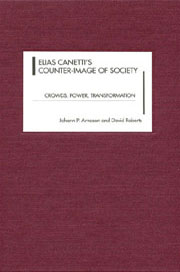3 - Religion, Crowds, and Power
Published online by Cambridge University Press: 05 February 2013
Summary
The myths and religions of mankind are a constant subject of reflection in Elias Canetti's Aufzeichnungen, which cover a period of fifty years from 1942 to 1993. Although the pervasive presence of myths and religions in Crowds and Power has been frequently noted and has begun to attract closer attention, it cannot be said that the relationship between religion, crowds and power has been adequately studied. Here it would seem that Canetti is to blame in his insistence that the nature of the crowd and of power can be grasped only in and of itself. Crowds and power are presented as primary data: the irreducible but at the same time the reductive anthropological source of history as the eternal return of the same, driven by the endless cycle of self-preservation and extermination, culminating in the mass wars, the genocidal regimes of the twentieth century and the ultimate weapon of annihilation. In such a view of history, culture is reduced in the last instance to nature, for are not death and the fear of death the ultimate instance that inhabit and impel crowds and power? Axel Honneth exemplifies this perception when he defines Canetti's image of man and society as the perpetuation of the archaic state of nature.
But if death is the ultimate biological datum, the greatest of natural evils (Hobbes), it is by the same token the primary source of humanization, of culture and religion.
- Type
- Chapter
- Information
- Elias Canetti's Counter-Image of SocietyCrowds, Power, Transformation, pp. 59 - 78Publisher: Boydell & BrewerPrint publication year: 2004



